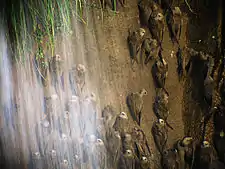| Cypseloides | |
|---|---|
 | |
| Great dusky swift (Cypseloides senex) | |
| Scientific classification | |
| Domain: | Eukaryota |
| Kingdom: | Animalia |
| Phylum: | Chordata |
| Class: | Aves |
| Clade: | Strisores |
| Order: | Apodiformes |
| Family: | Apodidae |
| Subfamily: | Cypseloidinae |
| Genus: | Cypseloides Streubel, 1848 |
| Type species | |
| Hemiprocne fumigata (sooty swift) Streubel, 1848 | |
| Species | |
|
See article | |
Cypseloides is a genus of swifts in the family Apodidae. It contains eight described species. They occur mainly in Central and South America. The exception being the American black swift, which has a wide range into North America.
Taxonomy
The genus Cypseloides was introduced in 1848 by the German naturist August Vollrath Streubel.[1] The type species was subsequently designated by Philip Sclater in 1865 as the sooty swift.[2][3] The name combines the genus Cypselus introduced by Johann Illiger in 1811 and the Ancient Greek -oidēs meaning "resembling".[4]
The genus contains eight species:[5]
- Spot-fronted swift (Cypseloides cherriei)
- White-chinned swift (Cypseloides cryptus)
- Sooty swift (Cypseloides fumigatus)
- White-chested swift (Cypseloides lemosi)
- Rothschild's swift (Cypseloides rothschildi)
- Great dusky swift (Cypseloides senex)
- White-fronted swift (Cypseloides storeri)
- American black swift (Cypseloides niger)
References
- ↑ Streubel, August Vollrath (1848). "Die Cypseliden des Berliner Museums". Isis von Oken (in German). Cols 348–373 [366].
- ↑ Sclater, Philip Lutley (1865). "Notes on the genera and species of Cypselidae". Proceedings of the Zoological Society of London: 593-617 [614].
- ↑ Peters, James Lee, ed. (1940). Check-list of Birds of the World. Vol. 4. Cambridge, Massachusetts: Harvard University Press. p. 242.
- ↑ Jobling, James A. (2010). The Helm Dictionary of Scientific Bird Names. London: Christopher Helm. p. 129. ISBN 978-1-4081-2501-4.
- ↑ Gill, Frank; Donsker, David; Rasmussen, Pamela, eds. (January 2022). "Owlet-nightjars, treeswifts & swifts". IOC World Bird List Version 12.1. International Ornithologists' Union. Retrieved 9 Jul 2022.
This article is issued from Wikipedia. The text is licensed under Creative Commons - Attribution - Sharealike. Additional terms may apply for the media files.